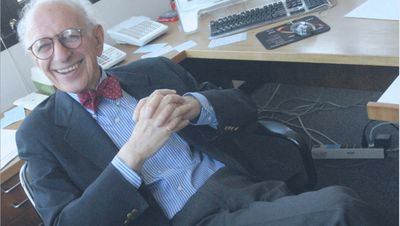Iconic Neuroscientist Eric Kandel Shares This Advice for Combating Memory Loss
Eric Kandel, 88, is a living legend. A specialist in the neurobiology of learning and memory, he received a Nobel Prize in 2000 for his work on the physiological basis of memory storage. Kandel is the Director of the Kavli Institute for Brain Science and Co-Director of the Mortimer B. Zuckerman Mind Brain Behavior Institute at Columbia University, where he has taught and conducted research for 44 years.
"If you walk two or three miles a day, you will release sufficient osteocalcin from your bones to combat non-Alzheimer's age-related memory loss."
And he's still going strong. Leapsmag Editor-in-Chief Kira Peikoff recently caught up with Dr. Kandel about his latest research, his advice for fellow seniors, and his opinions on some of the biggest challenges in neuroscience today.
What are working on these days?
I'm working on three problems: one is age-related memory loss, the second is post-traumatic stress disorder, and the third is the beholder's share: how a viewer responds to works of art. The beholder's share is a term that Alois Riegl created. He said there are two shares to a painting: the painter creates it, but it's not meaningful until somebody responds to it: the viewer, the beholder.
That's fascinating. As far as age-related memory loss, what are you learning in that area?
I'm learning that there are two forms of age-related memory loss. One is Alzheimer's disease, which we've known about for a long time. But the second is a more benign form which I call just age-related memory loss, which begins actually somewhat earlier and has a very different anatomical locus in the brain. It is caused by a different anatomical defect and responds to different therapeutic measures. It critically involves an area in the hippocampus called the dentate gyrus and it responds to a hormone released by bone called osteocalcin.
It therefore seems likely that one very effective way of combatting age-related memory loss is walking. If you walk two or three miles a day, you are likely to release sufficient osteocalcin from your bones to combat non-Alzheimer's age-related memory loss. In collaboration with Gerard Karsenty at Columbia, my lab at Columbia has been exploring this over the last year and a half.
Have you published anything about this yet?
We are just getting ready to do so.
"I think at the moment we should stick with trying to just reverse abnormalities."
Another question I have is about brain-computer interfaces to help cure disease or even provide cognitive enhancements. What do you think of companies like Kernel and Neuralink that are trying to push this new technology?
I think if it works it would be very nice. We have to see some direct evidence first, but it's certainly an encouraging approach. I think there are a number of directions we could take. The one I think at the moment is most profitable is to try to use the brain as it is and try to enhance it, restore it, refurbish it, make it function better from its age-related condition.
You mean, without some kind of machine interface?
Without necessarily introducing anything from the outside world. Although I have no objection whatsoever to introducing ancillary aids if they're beneficial and not harmful.
Do you have any opinion on whether neuroscience and technology should aim to provide an enhancement to the brain or just return it to baseline and cure disease?
I would be perfectly satisfied if we just cured diseases. I think at the moment we should stick with trying to just reverse abnormalities, but certainly … having the capability of becoming more intelligent, more attentive, capable of remembering things better than normal, that would be nice.
What do you think is the most important challenge facing the field of neuroscience today?
It's hard to say. I think the biology of consciousness is one fantastic problem. Trying to understand and successfully reverse some of the abnormalities of the brain, like age-related memory loss, schizophrenia, depression, manic depressive illness would be wonderful.
To be able to reverse memory loss, to allow people in their 70s, 80s, and 90s to live free and independent lives, is a major challenge for brain science.
Absolutely. Is there anything else you'd like to share with our readers about your research or the field more broadly?
I'd emphasize that brain science is a relatively young discipline but it's moving ahead in a very responsible and a very effective fashion, making progress in a number of areas, and is clearly sensitive to, and responsive to, the demands of the social situation. Right now, number one, the population is aging dramatically. In 1900, the average life expectancy was 50, and now the average life expectancy is 78 for men, and 82 for women.
So people are living longer and therefore are having age-related diseases, including memory loss. To be able to reverse it, to allow people in their 70s, 80s, and 90s to live free and independent lives, is a major challenge for brain science in both its basic and its clinically applied fashion. I think this is very important and serious effort should be put into this.
Kira Peikoff was the editor-in-chief of Leaps.org from 2017 to 2021. As a journalist, her work has appeared in The New York Times, Newsweek, Nautilus, Popular Mechanics, The New York Academy of Sciences, and other outlets. She is also the author of four suspense novels that explore controversial issues arising from scientific innovation: Living Proof, No Time to Die, Die Again Tomorrow, and Mother Knows Best. Peikoff holds a B.A. in Journalism from New York University and an M.S. in Bioethics from Columbia University. She lives in New Jersey with her husband and two young sons. Follow her on Twitter @KiraPeikoff.
